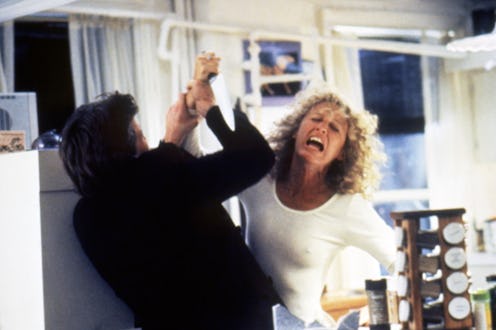TV & Movies
Paramount+’s Fatal Attraction Series Follows The Movie’s Alternate Ending
Glenn Close fought against reshooting the 1987 film’s final scenes.

Billed as a “deep-dive reimagining” of the 1987 film, Paramount+’s Fatal Attraction series isn’t a straight remake. Despite earning six Academy Award nominations, including Best Picture, the psychosexual thriller’s cinematic version sparked controversy for its reductive, antifeminist portrayal of Glenn Close’s bunny-boiling antagonist, Alex Forrest. Unlike its source material, the new series tells the story through updated lenses of privilege, personality disorders, and family dynamics. However, the original Fatal Attraction movie ending could have alleviated some of those issues decades ago.
The plot centers on the obsession Alex develops after married lawyer Dan Gallagher (Michael Douglas) ends their affair. In the final cut’s white-knuckle conclusion, Alex attempts to stab Dan’s wife, Beth (Anne Archer), while she’s taking a bath. Rushing into the bathroom just in time, Dan (seemingly) drowns Alex in self-defense. When she unexpectedly emerges from the bathtub clutching a butcher knife, Beth shoots and kills her. After giving statements to the police, Beth and Dan are left to figure out how to move on with their lives.
Those final scenes were a major departure from the Madama Butterfly-inspired version director Adrian Lyne originally filmed. In the alternate ending, Alex escapes her struggle with Dan in his kitchen, snagging the butcher knife with his fingerprints on her way out. She then frames Dan for her murder by using the knife to cut her own throat on her bathroom floor as music from Puccini’s opera plays in the background. After police arrest Dan in his front yard, Beth finds a cassette tape Alex left in her husband’s address book with a recorded suicide note of sorts. Beth believes this will be enough to clear Dan’s name, but his fate is never officially revealed.
However, test audiences didn’t respond positively to Alex escaping punishment, and Lyne decided to reshoot a different ending — even to Close’s vehement protest. “I loved the original ending. I always felt Alex was more suicidal than psychotic,” that actor, who scored a Best Actress Oscar nod for the role, recalled to The New York Times in 2017. “Six months after we finished shooting, I got a call that we had to reshoot the ending. I fought it for two weeks. It was going to make a character I loved into a murdering psychopath.”
The Paramount+ iteration leans more into Close’s preferred outcome and provides a more nuanced examination of her character’s mental health and point of view. Set in both 2008 and 2023, the new series’ present-day timeline finds Dan (Joshua Jackson) paroled after serving 15 years in prison for Alex’s (Lizzy Caplan) murder. In addition to reconnecting with his family, including now-ex-wife Beth (Amanda Peet), he’s also on a mission to prove his innocence. Meanwhile, the 2008 timeline more closely mirrors the events of the movie — but with some more modern updates.
“The series does not present Dan as an innocent bystander for whom a crazy person is trying to wreck his life. He is way more culpable,” Jackson, who referred to his character as “kind of a monster,” explained in a recent Bustle interview. “He can never see past his own ego to the damage that he’s eventually going to do to his wife, [and] ultimately, to his daughter. It means more to me now as a father, even more than as a husband.”
That’s certainly not how Douglas’s version of Dan was portrayed, though.
If you or someone you know is experiencing suicidal thoughts, call or text 988 to contact the988 Suicide & Crisis Lifeline, which provides free 24/7 support. You can also reach out to the Trans Lifeline at 1-877-565-8860, the Trevor Lifeline at 1-866-488-7386, or to yourlocal suicide crisis center.